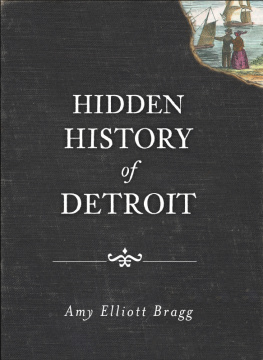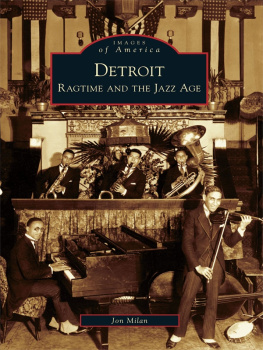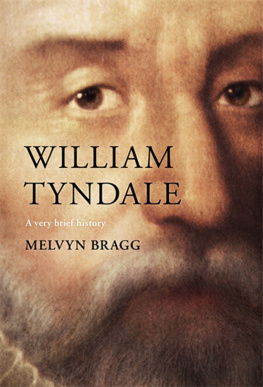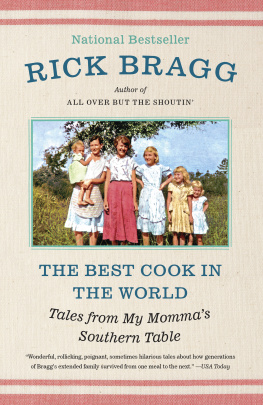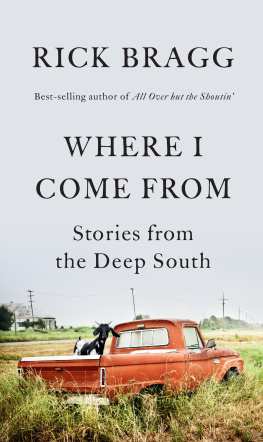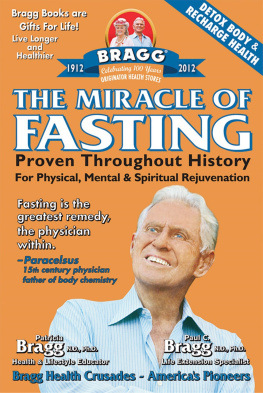Amy Elliott Bragg - Hidden History of Detroit
Here you can read online Amy Elliott Bragg - Hidden History of Detroit full text of the book (entire story) in english for free. Download pdf and epub, get meaning, cover and reviews about this ebook. year: 2011, publisher: The History Press, genre: History. Description of the work, (preface) as well as reviews are available. Best literature library LitArk.com created for fans of good reading and offers a wide selection of genres:
Romance novel
Science fiction
Adventure
Detective
Science
History
Home and family
Prose
Art
Politics
Computer
Non-fiction
Religion
Business
Children
Humor
Choose a favorite category and find really read worthwhile books. Enjoy immersion in the world of imagination, feel the emotions of the characters or learn something new for yourself, make an fascinating discovery.
- Book:Hidden History of Detroit
- Author:
- Publisher:The History Press
- Genre:
- Year:2011
- Rating:3 / 5
- Favourites:Add to favourites
- Your mark:
- 60
- 1
- 2
- 3
- 4
- 5
Hidden History of Detroit: summary, description and annotation
We offer to read an annotation, description, summary or preface (depends on what the author of the book "Hidden History of Detroit" wrote himself). If you haven't found the necessary information about the book — write in the comments, we will try to find it.
Hidden History of Detroit — read online for free the complete book (whole text) full work
Below is the text of the book, divided by pages. System saving the place of the last page read, allows you to conveniently read the book "Hidden History of Detroit" online for free, without having to search again every time where you left off. Put a bookmark, and you can go to the page where you finished reading at any time.
Font size:
Interval:
Bookmark:


Published by The History Press
Charleston, SC 29403
www.historypress.net
Copyright 2011 by Amy Elliott Bragg
All rights reserved
First published 2011
Second printing 2012
e-book edition 2012
ISBN 978.1.61423.345.9
Library of Congress Cataloging-in-Publication Data
Bragg, Amy Elliott.
Hidden history of Detroit / Amy Elliott Bragg.
p. cm.
Includes bibliographical references.
print edition ISBN 978-1-60949-269-4
1. Detroit (Mich.)--History. I. Title.
F574.D457B73 2011
977.4'34--dc23
2011036376
Notice: The information in this book is true and complete to the best of our knowledge. It is offered without guarantee on the part of the author or The History Press. The author and The History Press disclaim all liability in connection with the use of this book.
All rights reserved. No part of this book may be reproduced or transmitted in any form whatsoever without prior written permission from the publisher except in the case of brief quotations embodied in critical articles and reviews.
For General Friend Palmer, and for Scott.
CONTENTS
ACKNOWLEDGEMENTS
Huge gratitude to all of the following:
The Burton Historical Collection at the Detroit Public Library, for tireless stewardship of its incredible, illuminating archives and endless help for clueless researchers like me.
John Notarianni, for carefully made cocktails and dreamy late-night porch talks about Gabriel Richard.
Emily Eagle, for her smart, insightful reading and the kind of creative advice that only a radio producer can give.
Dan Austin, for recruiting me into service, for sharing priceless finds, for believing in my blog early on and for eagle-eyed editing.
Readers, friends and followers of nighttraintodetroit.com.
The History Press, especially Joe Gartrell, my commissioning editor.
Paul, Patti and Stephen Bragg, my fabulous new family-in-law.
Joan and Sy Ginsberg, my parents, for love, support and an education.
And my outrageously great husband, for his wisdom, his patience, his kindness, his generosity and his jokes.
INTRODUCTION
When I told my dad that I was writing a book about Detroit history, he asked, What kind of history? Like the kind you read in books?
Yeah, I said. Basically.
So whats the point? If its already in a book? Then he asked if I was going to write about prohibition, which, as it turns out, is a common question people ask when they find out youre writing a book about Detroit history. And I did write about prohibition. Just not the prohibition that people remember.
My dad didnt realize it at the time, but he hit a nerve I have about writing history: by definition, hasnt history already been written? And doesnt that make me a hack?
I started writing about history because I didnt know anything about it. I had just moved back to my hometown, Farmington Hills, from Milwaukee. I did it for a pretty good reasonmy then boyfriend, now husbandbut once I got here, I had some feelings to deal withteenage feelings. What did it mean to live in the suburbs again? What was this freakish place I had come from, with its acres of weedy parking lots, fake-looking front lawns, brigades of high-shine SUVs and miles of strip malls stretching into the sunset? And where had Farmington Hills come from? And how did it fit into the sprawling galaxy of cities, townships and villages that enveloped its hard-as-a-marble core of Detroit?
Before I started writing about Detroit history, I thought Detroit history went like this: French fur traders founded it, something something something, there was a fire at some point, then Henry Ford started making cars and then Detroit got really big! Something about prohibition and the Purple Gang, and then the riots in the 60s, when white people left town and made the suburbs. And now today, its getting better, sort of, but there are still a lot of empty buildings. And a lot of suburbs.
Its not that everything I knew about Detroit history was wrong. But it was certainly incomplete and hasty. Detroit sometimes forgets that there was ever a time before the automobile, or that its one of the oldest and most perpetually influential cities in the Midwest: battle ground of the War of 1812, capital city of the Michigan Territory, last stop on the Underground Railroad and then, variously, Stove City, Dry Dock City, Cigar City, Salt City and Pharma City decades before the Motor City had motors to move it.
The suburbs, too, existed and prospered long before the combustion engine. Farmington was established by Quakers in 1824. Nathan Power, Farmingtons founding father, is buried in its tiny Quaker Cemetery next to his first wife and five-year-old daughter, who both died during the cholera outbreak of 1832.
History gave me a way into Farmington and, ultimately, Detroit. I traipsed through cemeteries to meet the people I was reading about, visited the landmarks they left behind and blogged about everything I turned up. Some of my reports from the field were obvious. Others were obscure. I gravitated toward mysteries, rumors, legends, ghost stories, funny stories and stories about people drinking. Did you know that when Mad Anthony Wayne (victor of the Battle of Fallen Timbers and namesake of Wayne County) was exhumed from his grave in Erie, Pennsylvania, his bones were boiled in a big cauldron, stuffed into two saddlebags and then taken overland to his familys cemetery in Radnor? People say that his ghost wanders U.S. 322 looking for the bones that fell out of the packs. Have you heard the one about the 1817 Conant & Mack Company expedition to Pontiac, where Lewis Cass, Solomon Sibley, David McKinstry and Alexander Macomb snuck into a gristmill and had an impromptu flour-grinding competition? Some say that they gave the winner the first mayorship of Detroit. Then they fake-arrested a homesteader for not drinking with them and fake-sentenced him to death. He fainted. When he revived, they plied him with apologies and gifts, and he said that he would go through it all over again.
Depending on whom you ask, I became terrific fun at parties or a total bore at parties. And through it all, there were the booksalways the books (and library monographs and digital archives). And with the books was the creeping fear that I was just regurgitating what people had already written aboutyou know, in books.
But as I started working on my own book, I started thinking about the history of those history books, especially the two I loved the most, History of Detroit and Michigan and Early Days in Detroit, published in 1884 and 1906, respectively. Who had written them and why? And how did they look at the world? Were they informed by what the authors remembered of the city or what they saw coming for the city in the future? What moved them? Where did they see themselves in the portraits they drew of Detroit?
At John King, a majestic used bookstore in an old glove factory just off the Lodge Freeway, I found a copy of City of Destiny, written by George Washington Stark in 1943, during the Arsenal of Democracy years. The booksigned by the author, it turned outwas stuffed with newspaper clippings about Stark, a columnist for the Detroit Free Press and a self-described old-timer.
Stark was born in 1884, and he remembered pre-automotive Detroit, a muddy place full of spooked horses and barn fires but also peace, quiet, gentility and tree-lined avenues. He wrote
Next pageFont size:
Interval:
Bookmark:
Similar books «Hidden History of Detroit»
Look at similar books to Hidden History of Detroit. We have selected literature similar in name and meaning in the hope of providing readers with more options to find new, interesting, not yet read works.
Discussion, reviews of the book Hidden History of Detroit and just readers' own opinions. Leave your comments, write what you think about the work, its meaning or the main characters. Specify what exactly you liked and what you didn't like, and why you think so.

